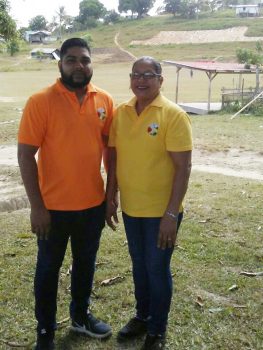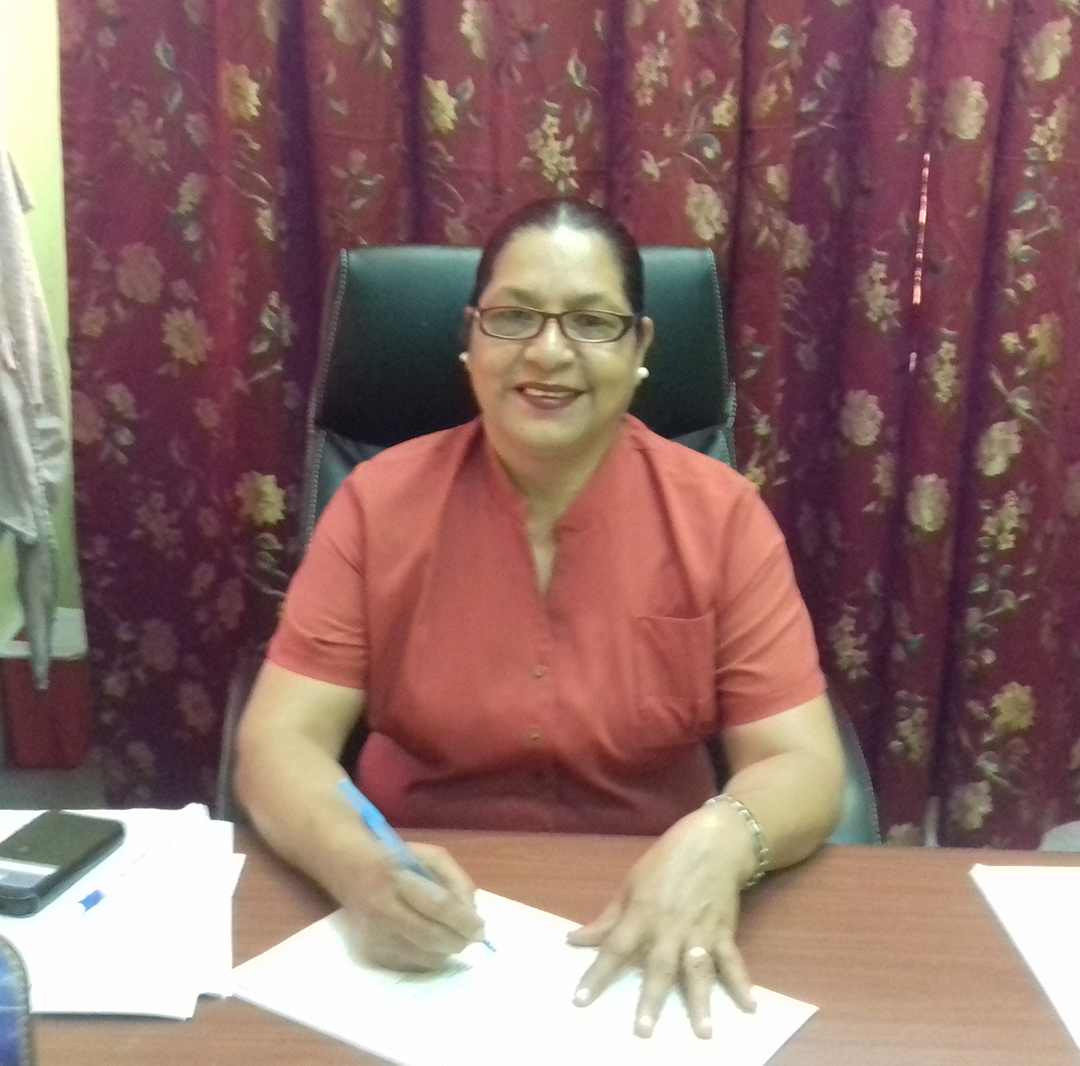Medic Lorlene Ramsundar is on a mission to ensure that every woman she meets knows the importance of having a Visual Inspection with Acetic Acid (VIA) or a pap test done, both of these reveal whether cancerous cells are present on the woman’s cervix.
Cervical cancer is 100% curable and this could only be done if it is diagnosed in the early stages, so Ramsundar feels it is imperative that every woman hears the message and gets an inspection or test done.
Therefore, do not be surprised if this woman, who has spent all of her working life in the medical field, meets you one day and after some pleasantries, asks if you have had a VIA or pap test done. And if you respond in the negative she would stress the importance of having it done. If your answer is in the affirmative, you would be told when it is necessary to have another one done.
“I believe it is what God wants me to do. I want to help women to understand that cervical cancer is curable, but it must be detected early. Women cannot wait until something is wrong then to have the test,” she stressed in a recent interview.
When the Sunday Stabroek caught up with her, Ramsundar was just about to start another busy day at the Cancer Institute of Guyana. With January being designated cervical cancer awareness month the institute had organised free pap tests for women—the usual cost is $3,500—and the medic, who is a retiree, has been assisting in this venture.

For the past few weeks it has been hectic for the medic, but she would have it no other way because for her the more women tested, the more lives saved.
Medic Ramsundar had taken a pap smear from this reporter recently and it was her approach, ensuring that the reporter was put at ease and making it clear that it was one of the best decisions she made, that was instrumental in her being approached for an interview.
She said her interaction with the reporter was nothing new; if she saw 50 women in one day and even if she was bone tired the approach would not be different as over the years she has come to understand the importance of helping people through what may be difficult situations for them.
It was in 1985, while still a young girl that she decided to study to become a nurse while living in Essequibo where she was born.
“I decided to become a nurse because I always admired the nurses in their white uniform taking care of the sick in the hospitals. For me, it was taking care of human beings with godly love,” Ramsundar said, explaining the start of her journey to where she is today.
Her years in the medical field she said, have been “good and bad.” While she would have met hundreds of persons, formed many bonds and helped many people, on the other end of the spectrum there was the lack of resources and at times the overburdened workload.
“But even so, I still did what I had to do because of the patients, they needed the help and we as nurses and doctors have to do our best,” she stated.
During her life as a nurse, Ramsundar has worked across Guyana in all the administrative regions.
In 1992, she became a midwife and her experience widened. She shared that she has done many deliveries.
“I had breach delivery, twin and even triplets and many, many single deliveries,” she said with a small smile.
In the case of the triplets, a doctor took over the procedure, and in the end the babies died but she said it added to her repertoire of experiences.
VIA training
It was in 2004 that Ramsundar became a medic and five years later in 2009 she was among ten persons who were trained by a doctor from the Johns Hopkins Hospital to do VIA.
She touts this form of cancer testing since it is simple and cheap, and the results are also given immediately; if needed the woman can commence treatment or be referred to a relevant clinic.
Since her training Ramsundar said, it has not been all smooth sailing, but she has seen the need and importance for women to know their status and this keeps her pressing on “for the well-being of women.”
She pointed out that when women have cancerous cells and start to see the symptoms such as pain, constant bleeding, bleeding after sex and odours, by then the cancer is already at stage three or four which is not very good.
Describing VIA as the ‘single visit approach,’ she said the cancerous cells are seen immediately and as explained above treatment can commence.
If the lesions are less than 75% the patients immediately undergo what is called cryotherapy, a treatment that uses a method of localized freezing temperatures to deaden an irritated nerve.
According to medicinenet.com the treatment involves a probe inserted into the tissue next to the affected nerve. The temperature of the probe drops to then effectively freeze the nerve. The freezing inactivates the nerve and, as a result, painful nerve irritation is relieved. Cryotherapy is said to be a relatively safe and effective means of treating localized nerve irritation.
Ramsundar explained that if the lesions are over 75% then the patient is referred to a doctor and the sample is also sent to a laboratory for further testing and the patient would later be contacted with advice on what further steps will have to be taken.
‘Overwhelming’
The medic described her experience over the years as “overwhelming” at times as she has seen women as young as 24 who were diagnosed with cervical cancer.
“When you see such young women with the cancer it puts a burden on you…,” she explained, adding that only last year January she had two women at the ages of 34 and 40 who were diagnosed with the cancer.
“Women need to understand that VIA and pap tests are very important,” she stressed.
She made it clear that once a woman has been sexually active for more than five years, regardless of her age, she needs to have the tests done. And if the woman is HIV positive it is imperative that a test done every year since because of the weak immune system caused by the virus that person is more prone to infection.
She has had some draining experiences in cases where she had to inform women that cancerous cells were detected.
“If it is cancer, you really have to know how to talk to them. Some people cry, they really feel it. You have to influence them that they must have treatment and tell them it is not cancer it is cells that can be cancerous,” she pointed out.
“You have to talk to them very good so that they will accept the treatment right away,” she added.
Many of the women who go for the test are empowered, according to Ramsundar, but she revealed that during her outreaches in outlying areas there are women who indicate the need to have their husband’s consent before starting the cryotherapy and in many of these cases the woman does not return for the treatment.
While she believes that in 99% of the cases the women accept the treatment in the outlying area there remains a problem with women not wanting to take the decision on their own to have treatment that can ultimately save their lives.
There have been some cases where patients are diagnosed too late and handed over to oncologists, but they die; then there are other cases where the diagnosis is not in the late stages, and these women are alive today to testify.
“I have had staff, people who I work with over the years who died from cancer and that was very tough. If only they had known earlier…, that is why it is important for women to get the VIA or test done,” she once again stressed.
Ramsundar is married with three sons—the eldest is Dr Nyron Ramsundar who is stationed at the oncology department of Georgetown Public Hospital Corporation.
She said her husband and sons know her passion and support her and she just has to inform them that she is going on outreaches. At times Dr Ramsundar accompanies her.
She comes from a family of 11 and she has an identical twin whom she is very close to. As she puts it, she was a late discovery as it was only after her sister was born that it was a discovered that another baby was in the womb.
“I will continue to do this as long as I have strength, I do it because God has blessed me, and it is my calling,” she said.










